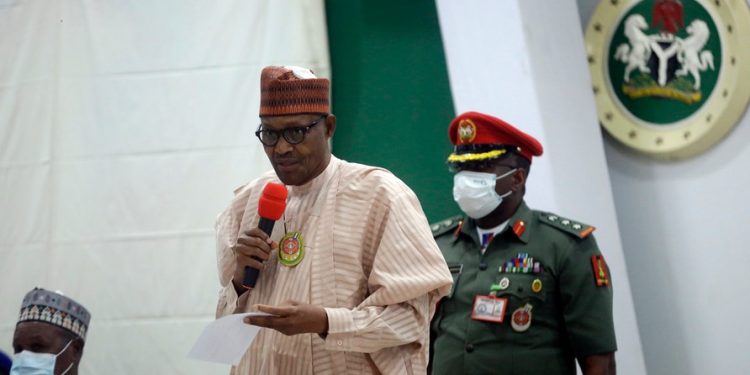ABUJA – Nigerian President Muhammadu Buhari named four new military chiefs Tuesday amid mounting calls to do something about widespread insecurity. While some Nigerians welcome the change in military leaders, security experts say the new chiefs are facing major challenges to stop terrorism, a string of kidnappings, and instability.
President Buhari’s senior special adviser, Femi Adeshina, released a statement Tuesday announcing the resignation of four service chiefs, including the military chief.
The presidency named Major General Leo Irabor, who was appointed chief of the defense staff and three others to head the army, navy and air force.
It is the first time the Buhari administration has changed service chiefs since 2015, despite declining security and calls for their removal.
Buhari thanked the chiefs for their “overwhelming achievements” in bringing in lasting peace to the country but experts say that position is hard to support.
“It would be a bit difficult really for Nigerians to be convinced that the immediate past service chiefs recorded overwhelming achievements,” said security expert Kabir Adamu. “The insurgency, the terrorism has been raging for the past 11 years and it’s still not contained.”
Apart from the Boko Haram insurgency in the northeast, the new service chiefs will face threats of growing banditry, kidnappings, and clashes between herders and farmers.
While many Nigerians praise the president’s appointments and expect positive outcomes, Adamu says any serious change won’t be immediate.
“If you look at the entire security subsector, there are 27 ministries, departments and agencies, and these new service chiefs are only four out of those 27, so even if they’re superheroes, they’re not likely to achieve any major improvement if the other 23 are not playing their roles,” said Kabir Adamu.
Meanwhile, human rights activists are calling for investigation of the outgoing chiefs for unlawful killings and human rights violations under their watch.
Last October, activists accused military of shooting at youths protesting an end to police brutality at the Lekki toll gate in Lagos.

“The investigation for some human rights violations, there were a lot under their leadership, and some other corruption allegations, they’re valid,” said Senator Iroegbu, founder of a magazine on security, The Global Sentinel. “But I don’t know if the current administration will have the political will to do that,” he added.
Since 2009, at least 36,000 people have been killed in armed conflicts in Nigeria, and violence has spread into neighboring Chad, Niger and Cameroon.

On social media, thousands of Nigerians have clamored for more respect for human rights, but experts say the security systems need reforms to ensure lasting peace.
By Timothy Obiezu, VOA NEWS






